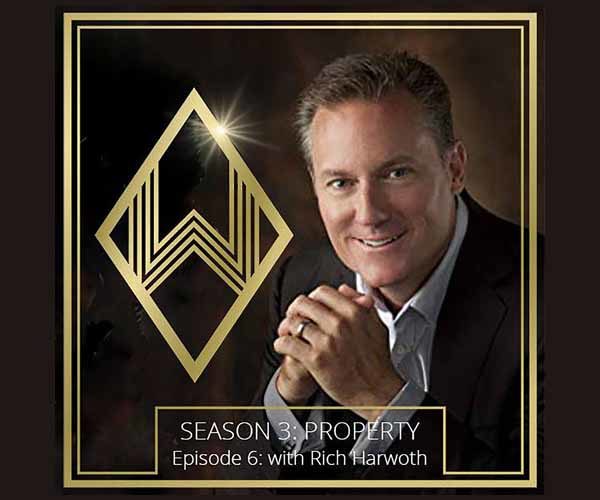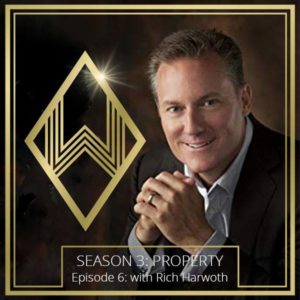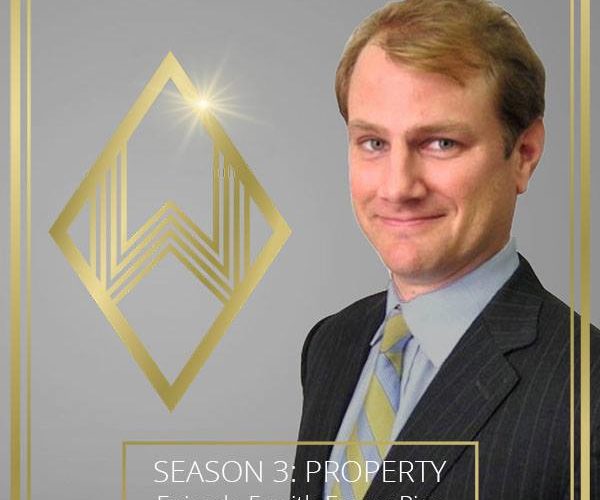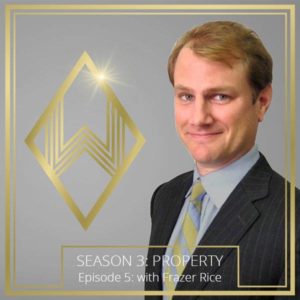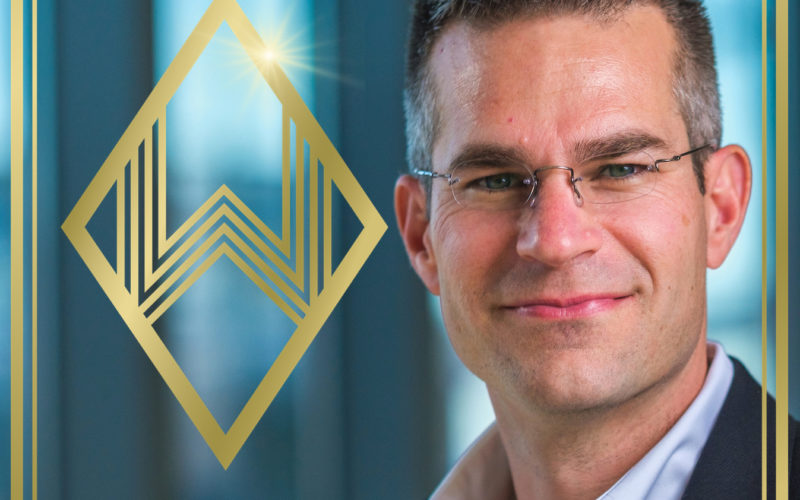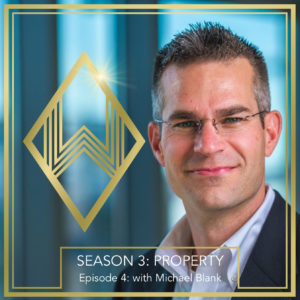The Principle Of Grit with Angela Duckworth
Podcast: Play in new window | Download
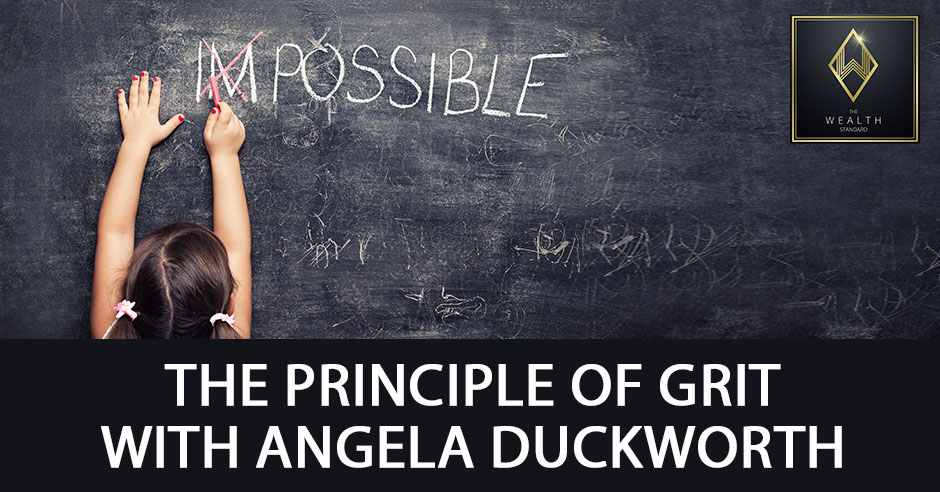
American academic, psychologist, and popular science author Angela Lee Duckworth talks about the principle of grit and why it is an important component to success. She is a Christopher H. Browne Distinguished Professor of Psychology at the University of Pennsylvania where she studies grit and self-control. Angela takes us into the science behind these characters as she also imparts her non-profit called Character Lab. Learn how she discovered this principle as she shares its opposite and how DNA plays a part. She talks about the roles models that exemplify those characters plus developing grit among children, exploring how failure is not a bad thing while sharing the differences among generations when it comes to society’s pressures.
—
Listen to the podcast here:
The Principle Of Grit with Angela Duckworth
My guest is Angela Duckworth and she is the Christopher H. Browne Distinguished Professor of Psychology at the University of Pennsylvania. She’s also the Founder and CEO of Character Lab, which is a not for profit whose mission is to advance the science and practice of character development. She’s also the author of the New York Times bestselling book, Grit: The Power of Passion and Perseverance. Angela, thanks for joining me. It’s awesome to have you on.
I’m so happy to have this conversation.
For those who don’t know you, you’re right next to Simon Sinek as far as TED Talk views are concerned. Would you mind going into your experience in discovering the principle of grit?
I am a psychologist by training. Before I was a psychologist, I was a teacher. I taught kids math in middle school and high school. The fascination I have with grit and with achievement in part stems from being a teacher and watching kids. Some of them do fantastically well. Others in the same exact classroom, under the same roof, using the same books and of seemingly a comparable intelligence were not doing well. One of the reasons that some do well in life and some don’t is the ability to muster perseverance and passion for something over long periods of time, not giving up. Also thinking about something because you want to be in adulthood, at least voluntarily obsessed by something so that you’re always working on it in the back of your mind.
One reason that some do well in life and some don't is the ability to muster perseverance and passion for something over periods of time. Click To TweetThis helps me sometimes to understand a word or an idea is by knowing what the opposite is. What would you say the opposite of grit is?
The opposite of grit would be apathy, not caring and certainly not doing anything about a goal that means something to you.
That’s what I thought it is. It’s not caring about something. It’s being okay with mediocre things and mediocre results.
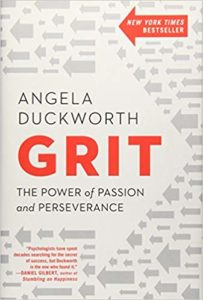
Grit: The Power of Passion and Perseverance
There are some people who would say, “I have a good work ethic,” but they are working on one thing after another. There’s no consistency in the direction in which they’re working. That’s also a failure of grit is to be working hard but on very different things all the time. There’s nothing immoral about that but I do think it’s hard to be excellent at something unless you work at it for a while.
I would also say the drive behind the effort is also important in a sense to identify. As you’ve done a tremendous amount of study and research around the principle, what is the common denominator as far as where it comes from?
One of the things that I should say at the outset is that this question of, “Is it in my gene? Was I born gritty?” There are people that we know who are like, “They were like that when they were two years old.” There is a genetic component to grit. In other words, your DNA does influence how gritty you are, but that’s also true of extraversion and your height and your preference for broccoli. I’m not kidding. These have all been studied in twin studies and everything about you is partly your genes. I should acknowledge that, but I don’t think it’s worth obsessing over in part because it’s true for everything. It doesn’t mean that our experiences don’t matter, they enormously matter. Maybe the most important thing about grit is having a role model. Somebody that you’ve seen work hard, get up again and somebody who wears it on their sleeve that they love what they do, which is why leaders and also anybody who considers himself a mentor or a teacher to another person, they play a very important role in cultivating grit in other people.
What are some of the societal archetypes of grit now that you’re talking about role models and actual people that exemplify some of those characteristics?
If you look carefully at the life stories of the people that you admire, literally pick your favorite coach, sport, musician, politician or entrepreneur. It’s hard not to find stories of passion and perseverance of people who have been toiling for hours a little bit behind the scenes. If you look at Dwayne Johnson, The Rock, who comes from professional wrestling and makes it into Hollywood where he is signing these blockbuster deals more than once a year. If you ask him, it wasn’t luck and it wasn’t talent. It was that he was incredibly gritty. Also the hours of work that he puts in behind the scenes. They never show up on YouTube. You could, in a way, nominate your favorite high-achiever. Then when you start digging, have an open mind and look for whatever you want to look for, I do often find, at least I have found when I did that, I find grit.
It's hard to be excellent at something unless you work at it for a while. Click To TweetCharacter Lab, which is a nonprofit where you’re at right now, also something you spend a great deal of time with. I have three children and they’re all different. They all are born with different personalities and some are driven this way or some are driven that way. From a children’s standpoint, what are some of the techniques and the things you do to get kids to understand the importance of the principle of grit?
I’m also a parent, mine are sixteen and fifteen years old. There are two things parents can keep in mind when they want to bring out grit in their own children. One is about perseverance and work ethic. I do think kids are not born spontaneously wanting to work hard. It’s part of being an animal. You don’t see squirrels and the park doing push-ups. Effort is something that all animals try to avoid. In a way, we’re all lazy. When you want your kids to work hard, practice, take feedback, come at it again and go to a track meet even though it’s raining. These are things that parents have to play a role. You cannot expect your kids to do those things on their own.
When your kids are about the age that mine are, you will see that all of those times that you made them do things and maybe nag them a little bit, they do pay off. I used to think when I was raising my kids that they would do it on their own. I thought they would see my husband and myself work hard and do it on their own. They do need more direct parenting than I thought. On the passion side though, which may be even more important or at least as important, is that you have to watch your kids for what they’re interested in. Encourage them to sample widely, to try things and to develop those interests.
Nothing is sadder to me than a 22-year-old graduating from, for example, the Ivy League school where I teach. They’ve got great skills. They know how to read, how to write. They’ve got great math skills but they have no interest. You’re like, “What are you passionate about?” They’re like, “I don’t know.” That is so sad. Kids do have interests that are emerging in them, but their parents can help them. If you noticed that your kid seems to throw the ball around a lot, encourage them to try some sports. My own daughter, Lucy, she was thinking about food all the time. She was baking or trying to bake. I said to her when she was about thirteen or fourteen, “You could probably get a job like volunteering in a kitchen at a restaurant.” She’s like, “That’s ridiculous. I’m too young.” She was scared. She was shy and I made her do it. Now, she works in kitchens. She has a Saturday job. She would fully own that baking as one of her core interests that she’ll have her whole life. Don’t just work on work ethic as a parent, also be vigilant at trying to get your kids to develop interests.

Principle Of Grit: There is always something to be learned from mistakes because mistakes are information.
I’m going to break down a couple of things that you said, which I’ve struggled with in a sense because my two oldest are girls. I have a four-year-old too. I grew up with all boys and I played sports. I’ve got a huge wake-up call with my wife and two girls as far as understanding how they work and what they’re driven by and the care and the difference than men. For girls, especially at that age where you drive and you push, failure can have a different context, especially when it comes to the social side of things. What are some of the ways in which you have helped your children or you’ve seen children taught or influenced? That helps them get through those difficult times as you’re trying to push them into a class or push them to do this or have them do that. What are some things you use as opposed to just fighting their belligerence?
It’s true that everybody fears making a mistake and failure. It’s also true that there does seem to be a female perfectionism like, “It’s not perfect.” That seems to be more common among girls than it is among boys. It plays out in all kinds of ways. Boys raising their hand before they even know what the question is, they’ve got their hand raised in class to answer it, whereas girls would be much more hesitant on average and then mortified if they make a mistake. There might be many boys out there who are like, “Whatever, I’m going to raise my hand the next time.” What do you do then if you feel like that’s maybe not going to be ideal for your daughters?
First of all, times are changing. I sometimes say to my girls, “I’m going to be a boy about it.” What I mean by that is I’m going to take a risk, I’m going to stand up for myself and I’m going to be bold and effectively raised my hand, but the times are changing. For me, that means something. I grew up in the ‘70s and that to me is how boys act. My own teenage girls get annoyed at me when I say that. They’re like, “What do you say that for?” There’s no reason why boys would be more confident than girls. The times are changing and yet I still think that there are some persistent differences that we can do something about. If we can teach our girls and our boys that mistakes are information, if you raise your hand and you get the wrong answer, then there’s something to be learned there.
It’s like, “Why did you say seven? The answer is nine, not seven.” There was a reason why you said seven and there’s a huge amount to learn from that. If we can get the emotion out of it, and the paralyzing fear of embarrassment, shame and like, “I’m not perfect.” Then take mistakes and correct answers as information, we’ll be like this Rudyard Kipling poem that is called If. There’s a stanza that’s the last thing that you see before you enter the center court at Wimbledon. The players all have to walk onto the center court under the same. It was like, “If you can meet with triumph and disaster and treat those two impostors just the same.” What that poem means in that line is that whether you get the right answer or the wrong answer, you win the game, you lose the game, you get picked for the fellowship or you don’t. They are impostors because it’s just information. It’s life and your job is to learn from it. Good, learn from it. Bad, learn from it; always learning.
Whether you get the right answer or the wrong answer, you still win the game. Click To TweetWhere does the idea behind, “Failure is a bad thing and I’m afraid of it,” come from? Failure is a positive thing that is necessary to learning, especially learning in a meaningful way.
Nobody knows, honestly. I was having a meeting with neuroscientists about this very question, “Why are mistakes so terrifying and why do we not want to make them in front of other people in particular?” It’s one thing to fail on your own, but it’s terrifying to fail in front of other people. I don’t think anybody really knows but here are our guests, the collective group of scientists that have been working on this that I’ve been meeting with. There is something that happens when you’re five and you go to kindergarten and you’re in school and you’re now being evaluated. If you noticed two and three-year-olds, they drop stuff all the time. They’re making messes, they break things and they don’t care. They’re like wrecking balls but crucially, you don’t see a lot of shame or embarrassment when they fall down.
If I fell down in front of you, I would be embarrassed before I even felt pain physically. It would be like I’m humiliated before I get worried about whether I broke my kneecap or something. What happens between four and where you and I are? There’s something about going to school, being evaluated and everyone is seeing how worthwhile they are relative to others. I don’t think it’s the fact that we go to school. Maybe it’s about being older. If we can remember what it was like to be a young kid and to go back to where we started, that is how the people that I study who are continuously improving, it’s how they’ve evolved. They have a beginner’s mindset.
I think about that all the time especially with kids. There’s this paradox where you want them to succeed and you want them to be happy, but you realize that success isn’t going to come about by always being happy. There’s going to be instances and pressures and failures are going to make them very upset. I’m not sure if it’s avoidable but I’ve thought about the same thing. I have a bigger team here and we try to provide good context around the principle of failure. The principle of failure is a socially designed idea if you think about it. It’s good because the biggest successes I’ve seen, they failed the biggest. It’s interesting that I don’t know if it’s a failure muscle or something that you stretch and build, but I see that. The grit idea, as I’ve thought about having this interview with you, is what happens when you experienced that.

Principle Of Grit: As immense innovation continues to occur, so does the pressure from society’s expectations.
It’s such a profoundly insightful thing that you just said. I have a student who is working with me and she finds that people can have two different attitudes about failure. There are people who think that failure is debilitating. It’s destructive and bad like a typhoon, you should avoid failure at all costs. The alternative is that there is a silver lining to failure that, of course, you would rather be successful at least in the instance, but that failure is the way to learn that failure can be strengthening. To see failure as a cloud with a silver lining. I want to emphasize that it’s not that we know anybody who’s like, “I hope I trip every time I take a step. I hope that all my ventures go bankrupt,” but to see the cloud and then to also look for the silver lining is adapted. What she finds is that when parents have failure and is potentially also enhancing as well as painful that their kids can be much more growth-oriented and less fearful about making mistakes.
I would say adding to that, it isn’t this one-time mental shift. It’s a philosophy or it’s a way of living if you think about it. I do believe some of the books that you reference in your book and also in other instances, Carol Dweck’s Mindset book, there’s a lot of talk around this idea. It’s exciting because I look at generations and we’re in the similar generation and the generation of my kids and the generations in between. It is fascinating to me how their mindset associated with life is different. Would you maybe speak to that as you look at Millennials, you look at your kids? I’m not even sure what the generation is called. What you’ve seen is their exposure to more information. Their exposure to more judgment in a sense because 30 years ago it was your class, it was where you went to church, who was your neighborhood. Now it’s exposed to a very wide audience. I’m not sure if that has any correlation to what their potential is. How have you seen the different generations deal with this idea of perseverance based on the expectation that society has for them?
It’s a hard question but it’s a great question. How are the Millennials different from the greatest generation? How are the kids growing up now different from our generation? It’s something that you wish you had a time machine for. As a scientist, I can’t do what scientists do, which is do an experiment. I have to get a kid from the 1950s to come into the lab with the kid from now and that’s a real limit. If you think about what it was like to grow up in our generation, I want to take you back in time even more. Imagine you’re growing up in a village 300 years ago. You don’t even know any more than 100 people. There are the people in the village. You might be the best musician in the village. You could be the second-best baker in the village. To be the best baker, it’s out of seven billion people because the world is flat and we can make all comparisons. You’re very unlikely to be the best musician because there are seven billion people around. I do think of that and this is a guess because I don’t have a time machine. My guess is that that does produce a lot of stress, pressure, uncertainty and insecurity.
One of the mysteries that science hasn’t figured out is that rates of depression and anxiety, in particular, are going up. Not only in the United States and not only among teenagers but in other age groups and also all around the world. You have to ask, we have more food, we have more entertainment, we have more safety, crime is going down, but still anxiety is going up like, “What’s going on?” I do wonder whether it’s in part because these comparisons are not with 30 people anymore, they’re not with 100 people, they’re not with 1,000 people. You’re comparing yourself to everyone. You’re not as cool as Beyoncé. You don’t sing as well as Adele and you’re not as fast as Usain Bolt and you’re not as good looking as, fill in the blank. Those can be difficult to manage for the people who are growing up now.
Success isn't going to come about by always being happy. Click To TweetThis is what I thought of when you were speaking. My next-door neighbor who just moved, they moved from Palo Alto. There are a lot of people moving from California for a number of reasons, financially. His two little kids, there’s pressure growing up there because of the expectations set by the community and the immense amount of innovation that is occurring. Having a startup and starting a business and innovating, that is the label most are trying to achieve which I’m not sure is realistic for everyone. It’s a fascinating statement because the pressure is building. The significance of teaching some of the principles that you’re focusing at with your nonprofit, the Character Lab, that’s vital. I don’t think kids can get enough of it.
I would say parents these days, and I’ve put myself into this position. I have to work a lot and the amount of time I spend focused on understanding their experiences in life and then helping them to process them the right way and put them in the right context has been hard. That’s where services like yours are profound and it’s not just kids, it’s everyone. It’s adults too but more so with kids because kids are our future. I love the principle of grit because it’s one of those fundamentals to success. That also made me think of a couple other questions in regard to your study of success and achievement. What are maybe some of the other compliments or principles associated with the success or achievement equation or is it grit alone?
Definitely not grit alone. I won’t say much about luck, although I do believe there is luck. Definitely good luck, bad luck and anybody who believes differently just don’t they’re facing reality. There’s also talent. I don’t study talent, but I do think some people are better at us naturally. It doesn’t mean that we can’t change our talent, but I do think that there are advantages. Other than luck and other than talent and other than grit, what else? There are two things that highlight as general categories of things. One is interpersonal or social skills. I call these character strengths of heart, their generosity, gratitude, empathy, social agility, being able to manage different social situations. There are some careers where you don’t need it very much. Like I sit in this room and I program on this computer, and nobody talks to me. Almost all careers require that you interact in a harmonious and positive way with other people. CEOs tell me all the time that in addition to grit, they want people with social skills with these teams.
The second category would be curiosity or what I call character strengths of mind, curiosity, creativity, intellectual humility. This is essentially being a very good thinker and being somebody who has a fallback, who will always be like, “Let me think about that. Let me keep thinking about it because it’s clear from this conversation that that’s you. It’s not everyone because you can also stop thinking about it. A lot of people don’t think about it.” In terms of this equation, there’s luck, there is a talent, there’s grit. There are character strengths of heart, these social character strengths. There are character strengths of mind and being a curious, thoughtful, person who likes to flex the muscle of their mind. If you have all of those things, the odds are going to be in your favor.
One of the final questions that I wanted to ask you is as you studied this, and you’ve clearly put a lot of time, effort and resources behind studying this and helping others understand it, how has it impacted you as an individual, whether it’s professionally or with your family or personally?
Before I get out of bed every day, I do three blessings, three good things. It doesn’t take more than 60 seconds and sometimes it’s the same list. I’m like, “Jason, Lucy, Amanda,” because those are three good things in my life. Sometimes it’s like, “The avocados finally got ripe.” That’s one good thing, “It’s not raining now. I had a good meeting.” One of the things that is often on my list is that I love what I do. I feel like I have meaning and I have purpose. I can tell you feel the same. For those people who can wake up and get out of bed and say, “I don’t know how far I’m going to get, but this is a good road to walk down,” that’s me.
I know a lot of people who have almost infinite wealth or they have fame or they have power, but if they don’t have a sense of purpose like, “This road is worth walking down. I don’t know how far I’m going to get.” I emailed a student that I’d been studying. He’s gritty. I literally sent my email, “Cody, I will take my dying breath trying to figure out how to get kids to thrive.” He wrote me back and it was like, “We’re going to work on that together.” That, itself, is the greatest blessing and it’s possible for anyone. It doesn’t mean you have to win the Nobel Prize or the Super Bowl. Could everyone in this world wake up and feel like they’re working on something that has purpose and try their best to do a better job the next day? The answer is yes, everyone can. I hope everyone does do that.
The feeling you get of seeing somebody achieve and accomplish something, there are very few circumstances that serve better than that. I believe, and this is what I try to teach my kids and my team here and what I try to learn about, that whatever level you’re at, that level doesn’t dictate having that feeling. Being able to be of influence for somebody else and also driving towards something else yourself. The discovery of purpose is the whole Simon Sinek’s The Infinite Game and Game Theory. It’s not something you wake up one morning and have a thought pop in your mind but it’s a constant pursuit. It’s one of the greatest pursuits ever. There’s a high suicide rate in Utah that they’ve been talking about. I look at kids and with the limited experiences that they’ve had as far as understanding the meaning behind their experiences. The school system frustrates me sometimes. Their intention is genuine but the ability to talk to some of these skills and principles are absent unfortunately. Would you mind talking more about Character Lab and what you guys are doing and how you’re being of influenced to, whether it’s on an individual level or a school system level?
The biggest successes have been the biggest failures. Click To TweetCharacter Lab provides actionable advice to parents and teachers all based on science. For those grown-ups in the world who think about kids a lot and how to help them develop grit and gratitude, curiosity, self-control, creativity, honesty, all the things that Aristotle said make a good life, make a life worth living a life of meaning and purpose as you put it. There is a science behind those character strengths and we try to share it. Everything that we offer, watch this video, try this activity, try saying this to your kid, it’s all based on science. It’s supported by foundations and individuals, it is 100% free.
What are ways in which the audience can learn about Character Lab and follow you? Are there any other social media that you use to communicate?
I do have social media. I’m so bad at social media that I can’t even tell what the handles are. If you go to CharacterLab.org, you’ll see that there is a newsletter that I’m starting to write for parents and speakers and that’s free too.
Angela, it was awesome to have you on. Thank you so much for sharing your wisdom with us and I wish you the best.
Thank you. I enjoyed this.
Important Links:
- Character Lab
- Grit: The Power of Passion and Perseverance
- Mindset
- The Infinite Game
- CharacterLab.org
- Facebook – Angela Duckworth
- Twitter – Angela Duckworth
- LinkedIn – Angela Duckworth
About Angela Duckworth
 In her late twenties, Angela left a demanding job as a management consultant to teach math to seventh graders in New York City public schools. Several years in the classroom taught her that effort was tremendously important to success.
In her late twenties, Angela left a demanding job as a management consultant to teach math to seventh graders in New York City public schools. Several years in the classroom taught her that effort was tremendously important to success.
To begin to solve the mystery of why some people work so much harder and longer than others, Angela entered the PhD program in psychology at the University of Pennsylvania, where she was a 2013 MacArthur Fellow and is now a professor.
With Dave Levin and Dominic Randolph, she founded Character Lab with the aim of radically accelerating the science and practice of character development. Angela is the author of the New York Times bestseller, Grit: The Power of Passion and Perseverance, and shared her expertise in a 2013 TED Talk.

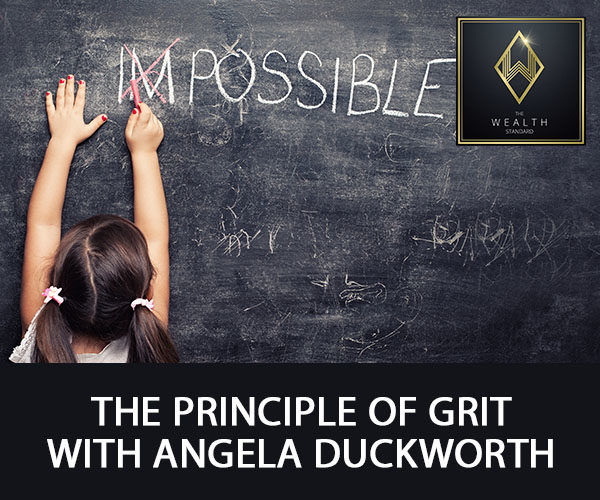


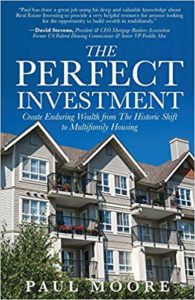



 An expert in the real estate space, Paul Moore of Wellings Capital graduated with an MBA from Ohio State and entered the management development track at Ford Motor Company. After five years, he departed to start a staffing company with a partner. They sold it to a publicly traded firm five years later for $2.9 million.
An expert in the real estate space, Paul Moore of Wellings Capital graduated with an MBA from Ohio State and entered the management development track at Ford Motor Company. After five years, he departed to start a staffing company with a partner. They sold it to a publicly traded firm five years later for $2.9 million.